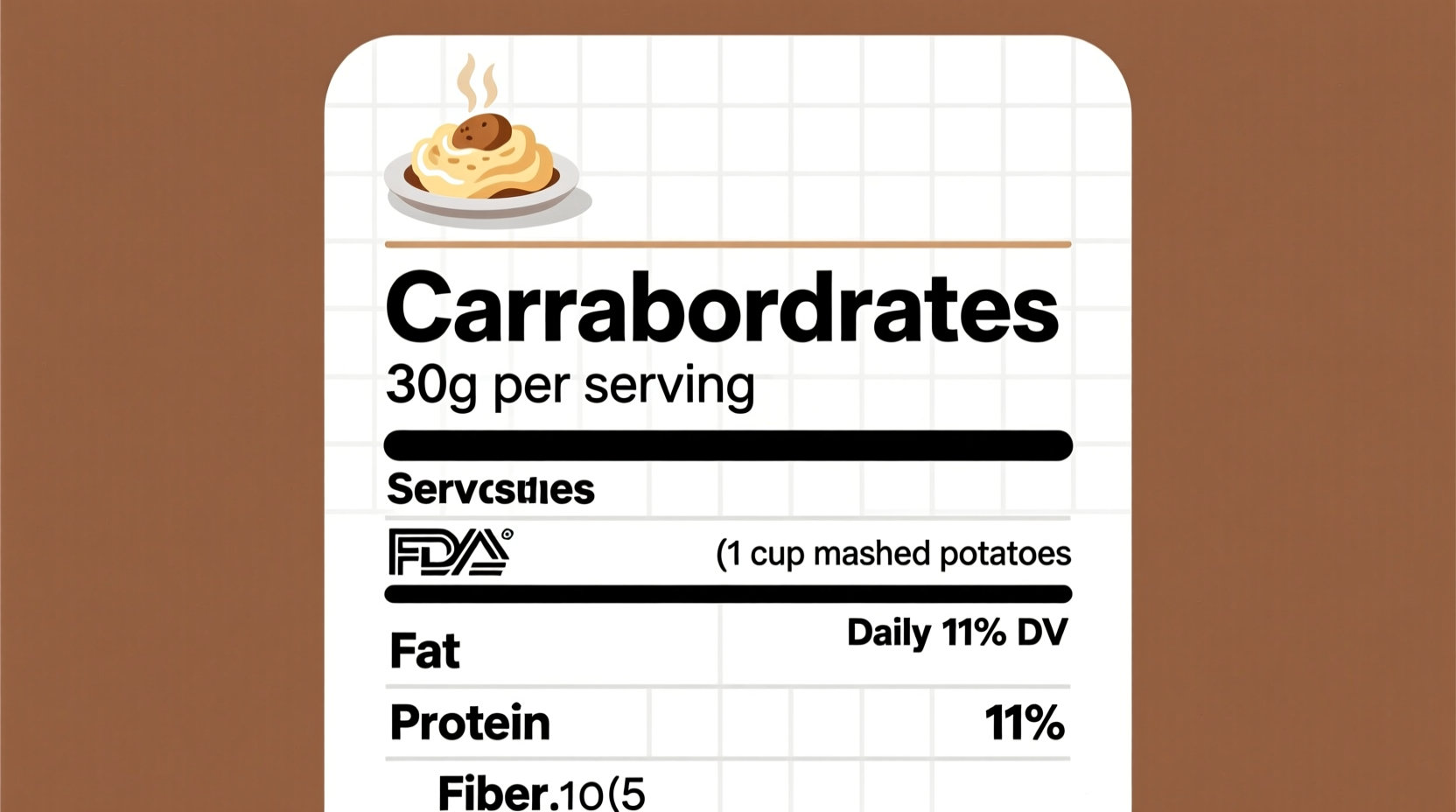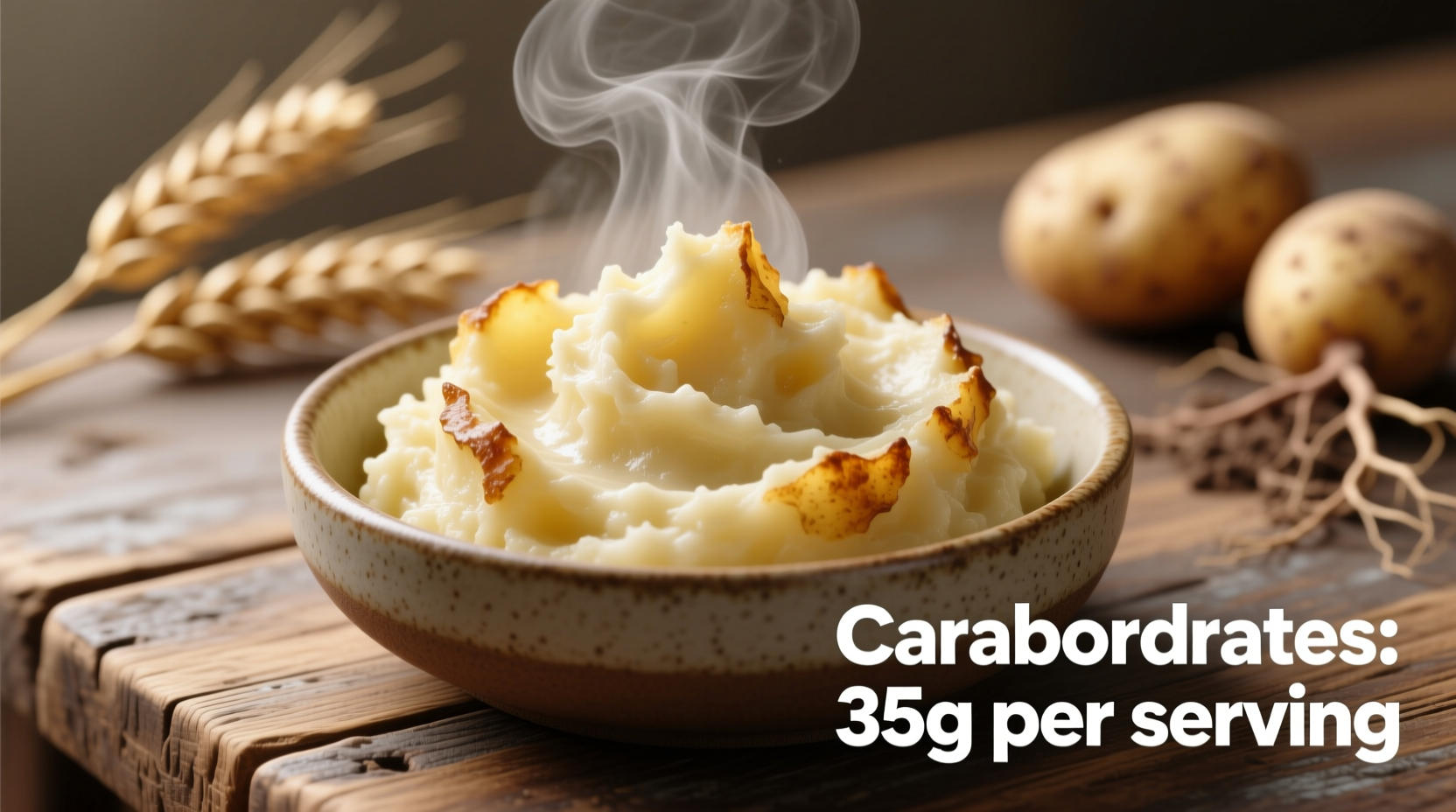One cup (210g) of traditional mashed potatoes contains approximately 29 grams of carbohydrates, with 2.3 grams of fiber and 1.5 grams of sugar. The exact carb count varies based on preparation method, potato variety, and added ingredients like milk or butter.
Understanding the carbohydrate content in mashed potatoes is essential for anyone managing their dietary intake, whether for weight control, diabetes management, or athletic performance. This comprehensive guide delivers precise nutritional information backed by authoritative sources, helping you make informed decisions about including this comfort food in your meal planning.
What Exactly Are the Carbohydrates in Mashed Potatoes?
Potatoes are primarily composed of starch, a complex carbohydrate that provides sustained energy. When prepared as mashed potatoes, the carbohydrate composition remains largely intact, though preparation methods can influence the final nutritional profile. According to the USDA FoodData Central database, a standard serving of mashed potatoes (1 cup or 210g) contains:
| Nutrient | Amount per 1 Cup (210g) | % Daily Value* |
|---|---|---|
| Total Carbohydrates | 29g | 10% |
| Dietary Fiber | 2.3g | 8% |
| Sugars | 1.5g | - |
| Protein | 3.5g | 7% |
| Calories | 200 | 10% |
*Percent Daily Values are based on a 2,000 calorie diet. Your daily values may be higher or lower depending on your calorie needs.
This nutritional profile comes from traditional mashed potatoes made with russet potatoes, milk, and butter. The carbohydrate content can vary significantly based on preparation choices, as we'll explore next.
How Preparation Methods Affect Carbohydrate Content
The way you prepare mashed potatoes directly impacts their carbohydrate density and glycemic response. Understanding these variations helps you make smarter choices based on your dietary goals:
Potato Varieties Matter
Different potato types contain varying amounts of starch:
- Russet potatoes: Higher starch content (about 15-17% carbohydrates by weight)
- Yukon Gold: Medium starch content with naturally sweeter flavor
- Red potatoes: Lower starch content with more moisture (about 12-14% carbohydrates)
Preparation Techniques That Alter Carb Impact
Research from the American Journal of Clinical Nutrition shows that cooking and cooling potatoes increases resistant starch content, which behaves more like fiber in the body:
- Cooking then cooling: Increases resistant starch by up to 50%, reducing the glycemic impact
- Adding acidic components: Vinegar or lemon juice can slow starch digestion
- Using alternative bases: Cauliflower or turnip blends significantly reduce carb content

Comparing Mashed Potatoes to Other Potato Preparations
Not all potato preparations deliver the same carbohydrate impact. Here's how common preparations compare per 100g serving:
| Preparation Method | Total Carbs (g) | Fiber (g) | Glycemic Index |
|---|---|---|---|
| Mashed (traditional) | 14.5 | 1.1 | 83 |
| Baked potato (with skin) | 20.1 | 2.2 | 75 |
| Boiled potato (with skin) | 17.5 | 2.0 | 78 |
| French fries | 29.0 | 2.7 | 75 |
| Cauliflower mash (alternative) | 3.0 | 2.0 | 15 |
The glycemic index differences are particularly important for blood sugar management. While mashed potatoes have a higher glycemic index than other preparations, adding protein or healthy fats can moderate the blood sugar response.
Health Implications and Dietary Considerations
For individuals managing specific health conditions, understanding mashed potato carbohydrates becomes crucial:
For Diabetes Management
The American Diabetes Association recommends that people with diabetes can include starchy vegetables like potatoes in their meal plans when portion-controlled. A standard serving of mashed potatoes (½ cup) contains about 15g of carbohydrates, equivalent to one carbohydrate choice in diabetes meal planning.
For Weight Management
While mashed potatoes contain carbohydrates, they also provide satiating fiber and essential nutrients like potassium and vitamin C. Research published in the journal Appetite found that potatoes can be more filling than other carbohydrate sources like pasta or rice when prepared simply.
For Athletic Performance
Athletes often include mashed potatoes in their carb-loading protocols before endurance events. The complex carbohydrates provide sustained energy release, while the potassium content helps maintain electrolyte balance.
Practical Tips for Managing Carbohydrate Intake
You don't need to eliminate mashed potatoes from your diet—even if you're watching your carb intake. Try these evidence-based strategies:
Smart Swaps for Lower-Carb Mashed Potatoes
- 50/50 blend: Mix equal parts cauliflower and potatoes to cut carbs nearly in half
- Add fiber-rich ingredients: Stir in cooked lentils or white beans for added protein and fiber
- Use potato skins: Leaving skins on increases fiber content by 20-30%
- Try alternative bases: Parsnips, turnips, or celery root provide similar texture with fewer carbs
Portion Control Strategies
Registered dietitians recommend using the "plate method" for balanced meals:
- Fill ¼ of your plate with mashed potatoes or alternatives
- Fill ¼ with lean protein
- Fill ½ with non-starchy vegetables
Timing Matters for Blood Sugar Control
Consuming mashed potatoes as part of a balanced meal with protein and healthy fats slows carbohydrate digestion. The Journal of Nutrition reports that adding 15g of olive oil to a potato meal can reduce the glycemic response by up to 30%.
Common Questions About Mashed Potato Carbohydrates
Let's address some frequently asked questions with evidence-based answers:











 浙公网安备
33010002000092号
浙公网安备
33010002000092号 浙B2-20120091-4
浙B2-20120091-4